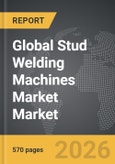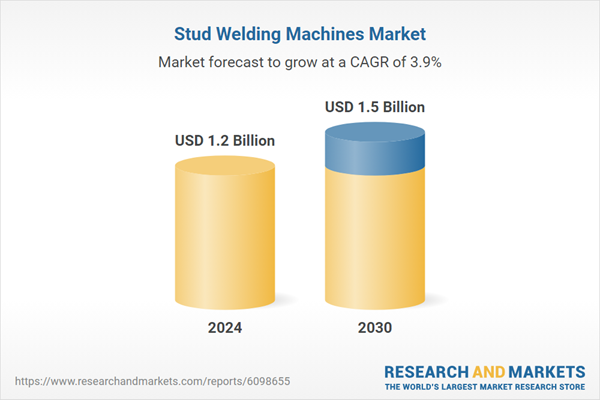Global Stud Welding Machines Market - Key Trends & Drivers Summarized
Why Are Stud Welding Machines Widely Adopted in High-Speed, High-Integrity Fastening Applications?
Stud welding machines are critical in applications requiring rapid, reliable fastening of metal studs to base materials without the need for drilling, tapping, or back-side access. They are extensively used in industries such as construction, automotive, shipbuilding, HVAC, and electrical enclosures, where strong mechanical joints are required for structural integrity, safety, and efficiency. The process enables high-speed installation with minimal surface disruption and consistent weld quality - making it well-suited for high-throughput manufacturing and field assembly environments.The appeal of stud welding lies in its efficiency, with welds often completed in milliseconds and with minimal operator input. The method ensures excellent load-bearing performance and corrosion resistance by forming a metallurgical bond between the stud and the base metal. Its compatibility with a wide range of materials - steel, stainless steel, aluminum, and alloys - makes it a flexible solution across use cases, while eliminating the need for post-weld finishing enhances its appeal in both aesthetic and functional applications.
How Are Technology Upgrades and Power System Innovations Enhancing Performance and Portability?
Modern stud welding machines are incorporating advanced power electronics, digital controls, and energy-efficient components to improve arc stability, penetration accuracy, and process repeatability. Inverter-based systems offer precise control over current, voltage, and time - facilitating consistent weld quality across various material thicknesses and diameters. Capacitor discharge (CD) and drawn arc systems are being refined to accommodate different stud geometries, base materials, and surface conditions with minimal spatter or thermal distortion.Portability is another key innovation area. Compact, lightweight, battery-powered units are being developed to meet the needs of mobile crews and job sites where power access is limited. These models support quick setup, enhanced mobility, and plug-and-play operation. Integration of LCD touchscreens, weld monitoring, and programmable presets is improving usability, reducing operator error, and allowing real-time diagnostics. As a result, stud welding machines are evolving into intelligent systems that blend precision, speed, and adaptability in both factory and field applications.
Which End-Use Industries and Job Environments Are Driving Market Demand?
The construction industry is one of the largest consumers of stud welding machines, particularly in steel structure fabrication, bridge deck reinforcement, and building façade anchoring. The ability to affix shear connectors quickly and securely is essential for composite construction and load distribution in multi-story buildings. Similarly, shipbuilding and offshore platform fabrication rely on stud welding for fastening insulation pins, electrical grounds, and interior outfitting components under demanding marine conditions.Automotive and appliance manufacturing sectors use stud welding extensively in body-in-white (BIW) processes for attaching fasteners, brackets, and grounding terminals with minimal heat impact on thin sheet metals. The trend toward lighter vehicle architectures and modular assemblies is increasing the use of stud welding for joining dissimilar or coated materials. Meanwhile, infrastructure upgrades, electrical cabinet assembly, and HVAC duct fabrication continue to generate consistent demand for both manual and automated stud welding solutions.
How Are Workforce Efficiency, Cost Control, and Quality Assurance Influencing Equipment Selection?
Labor efficiency and production throughput are key purchasing drivers for stud welding machines. Compared to traditional fastening methods, stud welding offers faster cycle times, reduced labor dependency, and minimal rework - leading to significant cost savings in large-scale fabrication settings. For manufacturers facing skilled labor shortages, automation-ready stud welding systems are emerging as critical tools to maintain output without compromising quality.Quality assurance is another priority, especially in safety-critical industries. Modern machines often come equipped with data logging, weld verification features, and parameter recording that support compliance with welding procedure specifications (WPS) and inspection protocols. Some systems also offer barcode scanning and job tracking capabilities, allowing seamless integration with factory management systems. Vendors that can deliver high-reliability equipment backed by training, service support, and flexible financing are better positioned to win long-term procurement contracts.
What Are the Factors Driving Growth in the Stud Welding Machines Market?
The stud welding machines market is expanding due to increasing demand for high-speed, high-integrity fastening solutions across industrial, structural, and transport sectors. The process's ability to deliver cost-efficient, clean, and mechanically robust welds in diverse environments is reinforcing its relevance in modern fabrication workflows. Advancements in digital control systems, portability, and application-specific customization are further accelerating adoption across both traditional and emerging markets.As global infrastructure investment, industrial automation, and lightweight engineering trends continue to evolve, the future of the market will depend on how effectively manufacturers can deliver adaptive, energy-efficient, and precision-driven machines that meet the rising demands for speed, traceability, and structural reliability. In an era defined by performance and productivity, stud welding machines remain a critical enabler of scalable, high-quality metal fastening across a wide spectrum of applications.
Report Scope
The report analyzes the Stud Welding Machines market, presented in terms of market value (US$). The analysis covers the key segments and geographic regions outlined below:- Segments: Arc Ignition (Capacitor Discharge Stud Welding, Drawn Arc Stud Welding); Material (Steel, Aluminum, Copper, Brass); Stud Diameter (Below 3 Mm, 3 - 12 Mm, 12 - 18 Mm, Above 18 Mm); Operation (Automatic, Semi-Automatic); End-Use (Automotive, Shipbuilding, Electric Goods, Construction, Farm, Other End-Uses).
- Geographic Regions/Countries: World; United States; Canada; Japan; China; Europe (France; Germany; Italy; United Kingdom; Spain; Russia; and Rest of Europe); Asia-Pacific (Australia; India; South Korea; and Rest of Asia-Pacific); Latin America (Argentina; Brazil; Mexico; and Rest of Latin America); Middle East (Iran; Israel; Saudi Arabia; United Arab Emirates; and Rest of Middle East); and Africa.
Key Insights:
- Market Growth: Understand the significant growth trajectory of the Capacitor Discharge Stud Welding segment, which is expected to reach US$953.4 Million by 2030 with a CAGR of a 4.7%. The Drawn Arc Stud Welding segment is also set to grow at 2.6% CAGR over the analysis period.
- Regional Analysis: Gain insights into the U.S. market, valued at $317.2 Million in 2024, and China, forecasted to grow at an impressive 7.4% CAGR to reach $299.7 Million by 2030. Discover growth trends in other key regions, including Japan, Canada, Germany, and the Asia-Pacific.
Why You Should Buy This Report:
- Detailed Market Analysis: Access a thorough analysis of the Global Stud Welding Machines Market, covering all major geographic regions and market segments.
- Competitive Insights: Get an overview of the competitive landscape, including the market presence of major players across different geographies.
- Future Trends and Drivers: Understand the key trends and drivers shaping the future of the Global Stud Welding Machines Market.
- Actionable Insights: Benefit from actionable insights that can help you identify new revenue opportunities and make strategic business decisions.
Key Questions Answered:
- How is the Global Stud Welding Machines Market expected to evolve by 2030?
- What are the main drivers and restraints affecting the market?
- Which market segments will grow the most over the forecast period?
- How will market shares for different regions and segments change by 2030?
- Who are the leading players in the market, and what are their prospects?
Report Features:
- Comprehensive Market Data: Independent analysis of annual sales and market forecasts in US$ Million from 2024 to 2030.
- In-Depth Regional Analysis: Detailed insights into key markets, including the U.S., China, Japan, Canada, Europe, Asia-Pacific, Latin America, Middle East, and Africa.
- Company Profiles: Coverage of players such as ArcelorMittal S.A., Bekaert, Bridon-Bekaert Ropes Group, DowAksa, Formosa Plastics Corporation and more.
- Complimentary Updates: Receive free report updates for one year to keep you informed of the latest market developments.
Some of the 36 companies featured in this Stud Welding Machines market report include:
- Ador Welding Ltd.
- Bolte GmbH
- Changzhou Jinda Welding Co., Ltd.
- Cruxweld Industrial Equipments Pvt. Ltd.
- Cutlass Stud Welding
- HBS Bolzenschweiss-Systeme GmbH & Co. KG
- Heinz Soyer GmbH
- Hilti Group
- IKING Industrial Group Co., Ltd.
- Jasic Technology Co., Ltd.
- KÖCO (Köster & Co. GmbH)
- Lincoln Electric Holdings, Inc.
- Midwest Fasteners Inc.
- Nelson Stud Welding Inc.
- SPARKWELD ENGINEERING
- Stud Welding Products Inc.
- STUDMASTER®
- Taylor Studwelding Systems Ltd.
- TFP Corporation
- Voestalpine Böhler Welding
This edition integrates the latest global trade and economic shifts into comprehensive market analysis. Key updates include:
- Tariff and Trade Impact: Insights into global tariff negotiations across 180+ countries, with analysis of supply chain turbulence, sourcing disruptions, and geographic realignment. Special focus on 2025 as a pivotal year for trade tensions, including updated perspectives on the Trump-era tariffs.
- Adjusted Forecasts and Analytics: Revised global and regional market forecasts through 2030, incorporating tariff effects, economic uncertainty, and structural changes in globalization. Includes historical analysis from 2015 to 2023.
- Strategic Market Dynamics: Evaluation of revised market prospects, regional outlooks, and key economic indicators such as population and urbanization trends.
- Innovation & Technology Trends: Latest developments in product and process innovation, emerging technologies, and key industry drivers shaping the competitive landscape.
- Competitive Intelligence: Updated global market share estimates for 2025, competitive positioning of major players (Strong/Active/Niche/Trivial), and refined focus on leading global brands and core players.
- Expert Insight & Commentary: Strategic analysis from economists, trade experts, and domain specialists to contextualize market shifts and identify emerging opportunities.
Table of Contents
Companies Mentioned (Partial List)
A selection of companies mentioned in this report includes, but is not limited to:
- Ador Welding Ltd.
- Bolte GmbH
- Changzhou Jinda Welding Co., Ltd.
- Cruxweld Industrial Equipments Pvt. Ltd.
- Cutlass Stud Welding
- HBS Bolzenschweiss-Systeme GmbH & Co. KG
- Heinz Soyer GmbH
- Hilti Group
- IKING Industrial Group Co., Ltd.
- Jasic Technology Co., Ltd.
- KÖCO (Köster & Co. GmbH)
- Lincoln Electric Holdings, Inc.
- Midwest Fasteners Inc.
- Nelson Stud Welding Inc.
- SPARKWELD ENGINEERING
- Stud Welding Products Inc.
- STUDMASTER®
- Taylor Studwelding Systems Ltd.
- TFP Corporation
- Voestalpine Böhler Welding
Table Information
| Report Attribute | Details |
|---|---|
| No. of Pages | 570 |
| Published | January 2026 |
| Forecast Period | 2024 - 2030 |
| Estimated Market Value ( USD | $ 1.2 Billion |
| Forecasted Market Value ( USD | $ 1.5 Billion |
| Compound Annual Growth Rate | 3.9% |
| Regions Covered | Global |









